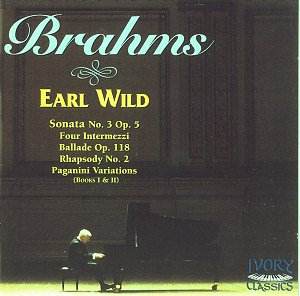Earl Wild has been a legend for longer than most of
us have been alive; here we have a brand new version of the massive
and taxing third sonata, recorded in his 87th year, a selection
of shorter pieces from two years earlier, and a 1982 live performance
from Paris of the Paganini Variations.
When we think of Wild, the picture in our mindís eye
is that of a keyboard wizard of the old school, one who combines a phenomenal
technical control with a touch of dare-devil "I do it my way".
After all, he has been something of a specialist in works and transcriptions
by composer-pianists of the early 20th Century romantic school
Ė remember his recording with Erich Leinsdorf of one of the Scharwenka
concertos at a time when such music was sneered at. And he looks the
perfect patrician virtuoso wizard. I remember him giving a concerto
in Edinburgh in the early 1970s Ė donít ask me which, it may even have
been the Scharwenka Ė and more than any musical phrase I recall the
visual image of his tall, erect figure (a very straight back) despatching
hair-raising passages with, apparently, total nonchalance. He hardly
seemed to be putting any effort into it at all! In this only Horowitz
surpassed him. I also remember the extreme clarity of his sound which
registered in the back rows almost as if he were only a few feet away.
Though he has been recording since 1937 he has not
been quite a household name on disc. He has not consistently been associated
with one company, like Rubinstein-RCA or Arrau-Philips and some of his
discs, such as the Rachmaninov concertos with Horenstein, came out almost
by stealth (as a Readersí Digest album) and remained unknown for many
years. We have also not had very many opportunities to hear him in extended
works, like the present Brahms sonata, from the general repertoire.
He now records for Ivory Classics and they deserve to make each othersí
fortune.
As befits a pianist in the old-school-virtuoso mould,
"Earl Wild plays Brahms" is definitely "Earl Wild plays
Brahms". If you listen to the recording of the sonata by the admirable
Stephen Hough on Hyperion, you will quickly sit back and find you are
listening to Brahms. At the end you will be grateful to Hough for playing
Brahms so well, but the interpreter is not forever present. I donít
want to suggest that Wild twists the music this way or that according
to his personal whims, in fact he doesnít. But in the same way as Horowitz
would frequently give performances with no detectable deviation from
the score, yet which proclaim his own personality in every bar, so it
is with Wild. Compare the way he begins with that of Hough; there is
something in the sound, so bright and spot lit in every note, something
in the phrasing, imperious and commanding our attention, something maybe
in the timing of rests, of the transition from one idea to the next.
And "Earl Wild plays Brahms" is an enthralling experience,
undimmed by his advanced age. Listen to how the scherzo leaps into life,
or how the textures of the finale are illuminated, or how the melodic
strands in the Andante espressivo are separated out from the accompanying
figures. The final climax of this latter movement put me in mind of
a story about Heifetz, who was berating a student for producing too
little tone at the climax of the Chausson Poème. "You
will be lost under the orchestra". A friend present at the lesson
intervened: "But, Jascha, the violin always is lost under
the orchestra at that point". But Heifetz would have none of it.
Unconvinced (with other violinists the violin was always drowned
at that part of the music) the two could only wait till the next time
Heifetz programmed the piece. And, sure enough, his powerful tone dominated
the whole orchestra. In the same way, Wild has the upper line in the
texture soaring over the rich textures in a way that most of us tend
to think a piano just canít do. Thatís great pianism.
The shorter pieces are equally spot-lit and up-front,
purged of the autumnal melancholy traditionally associated with them.
In at least a few cases I felt that Wildís own bright optimism was at
odds with Brahmsís natural melancholy (might not op.119/3 sound more
teasing at a fractionally slower tempo, and does not op. 76/6 surge
when it should reflect?), but it is salutary to hear them this way once
in a while. Only in op. 79/2 did I seriously feel that Wild was missing
the sheer blackness of one of Brahmsís most tragic and angry utterances.
The Paganini Variations are unique in Brahmsís work;
unique in their exploitation of a sheer virtuosity worthy of the violinist
who inspired them. Wild makes light of them in a marvellous display
of light and shade as well as of infallible technique that rightly evokes
cheers (and the French are inclined not to be lovers of Brahms). This
1982 recording also reminds us that the greatest pianists are harder
to record than the merely good ones. The "ping" to their tone
(Iíve heard Wild use this word in an interview), which is the means
by which they reach the back of the hall, can sound aggressive, even
bashy, under the close-up glare of the microphones. It does a little
here, but donít let that put you off. And in the recent recordings it
has at last proved possible to capture a great pianist without discomfort.
The sound has remarkable richness and presence. Comparison with the
Hough, as admirably recorded as it is played, shows this up too.
You wonít always want to hear Brahms played this way,
but if you care about the composer, or about the piano, youíve got to
have this.
Christopher Howell
